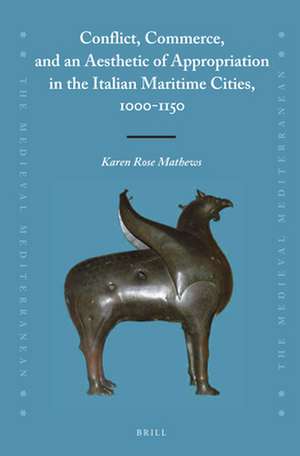Conflict, Commerce, and an Aesthetic of Appropriation in the Italian Maritime Cities, 1000-1150: The Medieval Mediterranean, cartea 112
Autor Karen Rose Mathewsen Limba Engleză Hardback – 17 ian 2018
Din seria The Medieval Mediterranean
- 18%
 Preț: 1431.68 lei
Preț: 1431.68 lei - 18%
 Preț: 1154.97 lei
Preț: 1154.97 lei - 18%
 Preț: 852.46 lei
Preț: 852.46 lei - 18%
 Preț: 848.36 lei
Preț: 848.36 lei - 18%
 Preț: 754.05 lei
Preț: 754.05 lei - 18%
 Preț: 1007.39 lei
Preț: 1007.39 lei - 18%
 Preț: 1490.62 lei
Preț: 1490.62 lei - 18%
 Preț: 839.94 lei
Preț: 839.94 lei - 18%
 Preț: 1042.84 lei
Preț: 1042.84 lei - 18%
 Preț: 1002.10 lei
Preț: 1002.10 lei - 18%
 Preț: 1129.51 lei
Preț: 1129.51 lei - 18%
 Preț: 676.64 lei
Preț: 676.64 lei - 18%
 Preț: 947.06 lei
Preț: 947.06 lei - 18%
 Preț: 964.11 lei
Preț: 964.11 lei - 18%
 Preț: 656.31 lei
Preț: 656.31 lei - 18%
 Preț: 720.21 lei
Preț: 720.21 lei - 18%
 Preț: 546.78 lei
Preț: 546.78 lei - 18%
 Preț: 520.91 lei
Preț: 520.91 lei - 15%
 Preț: 474.15 lei
Preț: 474.15 lei - 18%
 Preț: 725.92 lei
Preț: 725.92 lei - 18%
 Preț: 671.93 lei
Preț: 671.93 lei - 18%
 Preț: 523.61 lei
Preț: 523.61 lei - 18%
 Preț: 549.50 lei
Preț: 549.50 lei - 18%
 Preț: 547.09 lei
Preț: 547.09 lei - 18%
 Preț: 691.07 lei
Preț: 691.07 lei - 18%
 Preț: 516.74 lei
Preț: 516.74 lei - 15%
 Preț: 530.25 lei
Preț: 530.25 lei - 18%
 Preț: 819.57 lei
Preț: 819.57 lei - 18%
 Preț: 674.68 lei
Preț: 674.68 lei - 18%
 Preț: 1678.97 lei
Preț: 1678.97 lei - 18%
 Preț: 788.38 lei
Preț: 788.38 lei - 18%
 Preț: 590.11 lei
Preț: 590.11 lei - 18%
 Preț: 808.16 lei
Preț: 808.16 lei - 18%
 Preț: 921.87 lei
Preț: 921.87 lei - 28%
 Preț: 580.76 lei
Preț: 580.76 lei - 18%
 Preț: 778.50 lei
Preț: 778.50 lei - 18%
 Preț: 643.43 lei
Preț: 643.43 lei - 18%
 Preț: 1009.54 lei
Preț: 1009.54 lei - 18%
 Preț: 560.98 lei
Preț: 560.98 lei - 18%
 Preț: 878.63 lei
Preț: 878.63 lei - 18%
 Preț: 931.75 lei
Preț: 931.75 lei - 18%
 Preț: 965.55 lei
Preț: 965.55 lei - 18%
 Preț: 840.88 lei
Preț: 840.88 lei - 18%
 Preț: 841.58 lei
Preț: 841.58 lei - 18%
 Preț: 1138.52 lei
Preț: 1138.52 lei - 18%
 Preț: 1046.13 lei
Preț: 1046.13 lei - 18%
 Preț: 1047.39 lei
Preț: 1047.39 lei - 18%
 Preț: 840.41 lei
Preț: 840.41 lei - 18%
 Preț: 964.38 lei
Preț: 964.38 lei
Preț: 521.28 lei
Preț vechi: 635.71 lei
-18% Nou
Puncte Express: 782
Preț estimativ în valută:
99.74€ • 104.42$ • 82.53£
99.74€ • 104.42$ • 82.53£
Carte indisponibilă temporar
Doresc să fiu notificat când acest titlu va fi disponibil:
Se trimite...
Preluare comenzi: 021 569.72.76
Specificații
ISBN-13: 9789004335653
ISBN-10: 900433565X
Pagini: 238
Dimensiuni: 155 x 235 mm
Greutate: 0.45 kg
Editura: Brill
Colecția Brill
Seria The Medieval Mediterranean
ISBN-10: 900433565X
Pagini: 238
Dimensiuni: 155 x 235 mm
Greutate: 0.45 kg
Editura: Brill
Colecția Brill
Seria The Medieval Mediterranean
Notă biografică
Karen Rose Mathews, Ph.D. (1995), University of Chicago, is an Assistant Professor of Art History at the University of Miami. She has published extensively on the use of spolia in the visual culture of the Mediterranean, concentrating on the artistic production of medieval Italy.
Cuprins
AcknowledgmentsList of IllustrationsIntroduction: Visualizing Commerce and Conflict in the Maritime Cities of Medieval ItalyConflict and Commerce in the Medieval Mediterranean Visualizing the Relationship between Trade and Conflict Through an Aesthetic of Appropriation 1 Local Traditions and Norman Innovations in the Artistic Culture of Southern ItalyIntroduction Local Traders and Norman Warriors in Southern Italy Forging an Amalfitan International Style: The Art Patronage of the Local Elite Norman Architectural Patronage and the Spolia Aesthetic 2 Emulation of and Appropriation from Byzantium in Venetian Visual Culture Introduction Conflict, Trade, and the Venetian Presence in the Eastern Mediterranean Appropriated Relics from Byzantium Relics, Spoils, and Spolia in Venetian Art and Architecture 3 The Interplay of Islamic and Ancient Roman Spolia on Pisan Churches Introduction Commerce and Conflict in Eleventh and Twelfth-century Pisa The Signification of Ancient and Contemporary Muslim Spoils onPisan Churches 4 Rivalry with Pisa and Spolia as Plunder of War in Medieval Genoa Introduction Crusade Campaigns and Commercial Compensation Spolia as Plunder in the Art and Architecture of Genoa The Aesthetic of Appropriation and Competition with Pisa Conclusion: Shifting Significations of the Spolia Aesthetic Select Bibliography Primary Sources Secondary Sources
Recenzii
"As its title suggests, Karen Rose Mathews’s book argues that the use of spolia in the maritime cities was the result of two main factors: conflict and commerce. After an introduction, the book presents case studies of Salerno, Venice, Pisa, and Genoa, followed by a very short conclusion and an ample bibliography.[...] The comparing and contrasting of the selected cities is a fruitful one: rather than a general exposition of reuse in medieval Italy, the choice of salient examples within a limited period is methodologically sound. Mathews bolsters her claims with both material and written sources. She demonstrates how the appropriated objects are employed to different effect and in different manner. [...] this informative and well-documented book makes accessible a complex subject matter (which, except for Venice, has been discussed mainly by Italian authors) and highlights the multivalence of spolia with useful insights into their rich cultural associations". Bente Kilerich, in Speculum 95/3, July 2020.
